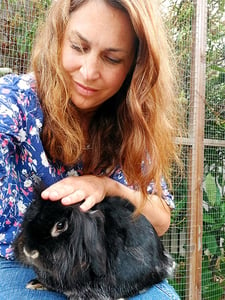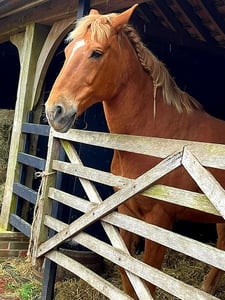The healing power of animals
When I was a child, we had a cat who always seemed to know if someone in the family was ill because she’d jump on their lap and sit with them or curl up at the end of their bed. Whenever this happened to me, I felt calmer and comforted. I was always curious about this. I learned from a young age that animals can be therapeutic. Over the years, other people have told me similar stories about their pets.
In this blog post, I want to share how animals have played a role in my recovery from Post-Concussion Syndrome (PCS) from a car crash in 2016. I want to encourage you, if you have PCS, to make more room in your life for pets and animals so that you can experience more of their comfort and healing power.
When you’re not feeling your best, it can help to have at least one animal around you, who knows and loves you unconditionally, allows you to pet them, provides companionship, doesn’t judge you and doesn’t demand an awful lot from you.
Research shows that even just stroking a pet or animal can be beneficial for our mental and physical health (https://www.hopkinsmedicine.org/health/wellness-and-prevention/the-friend-who-keeps-you-young). It’s scientifically proven that stroking a pet can lower a person’s stress hormone, cortisol; lower heart rate and blood pressure; increase the production of the hormone called oxytocin (also known as the ‘love hormone’) and even increase brain activity in the pre-frontal cortex and help with attention deficits (https://www.inverse.com/science/petting-a-dog-has-a-curious-effect-on-your-brain).
Dr Austin Perlmutter, a well-known American doctor, writes the following about pets on his website (https://www.austinperlmutter.com/post/3-ways-your-pet-may-improve-your-immune-health):
‘Chronic psychological stress is well known to damage our immune function, compromising our ability to fight off infections while increasing inflammation. Pets may be able to help ward off this destructive effect by dampening stress through companionship and the facilitation of social connections with others. Research has indicated that exposure to a therapy dog may help lower levels of the stress hormone cortisol. In another experiment designed to induce stress, children with access to their pet dogs felt less psychological strain.’
The calming influence of two rabbits
 At the time of my concussion, we had two beautiful black, and cream long-haired rabbits called Steve and Plum. They brought me so much happiness after my injury, and I felt so relaxed when I was with them.
At the time of my concussion, we had two beautiful black, and cream long-haired rabbits called Steve and Plum. They brought me so much happiness after my injury, and I felt so relaxed when I was with them.
For what seemed like forever after my injury, I felt intense anxiety, probably partly due to the injury itself and partly due to my stressful life circumstances as a result of the collision. I felt like I was in a state of almost permanent hypervigilance, but stroking the bunnies really helped me to calm down and feel safer. They were so gentle, and they’d sit on my lap for ages while I hugged and stroked them. At one stage, I had a real problem with a racing heartbeat and what felt like heart palpitations, and sometimes I’d have chest pain. The rabbits would let me comb their fur, and as I did so, I would feel my heart rate becoming more regulated, and I’d calm down.
We enjoyed the company of these much-loved bunnies for several years. They lived outside, and whenever we went into the garden, we would see them hopping around and watching us curiously. Sometimes we’d bring them inside the house for cuddles. My three children were thankful for their presence and comfort during what was a difficult time for them, coping with a mum with a brain injury.
Our mini-home zoo
Over time, we acquired a number of other animals, and it felt as if we’d gathered a little zoo around us!
A friend gave us a couple of tiny snails, and in what seemed like no time at all, these grew into enormous African snails. They were incredible creatures, and we were fascinated by them, but they grew gigantic very quickly, and one day they tried to escape. At that point, I decided I couldn’t look after them anymore, so my daughter and I took them on the bus one day to a local specialist pet shop, and they agreed to find them a new home.
We also had some fish called platys which look a bit like goldfish. We started with three or four and ended up with about 22 of them! My children loved watching the absolutely miniature, almost microscopic, fry growing into full-sized adults. In the end, it felt almost like a full-time job looking after them, so a friend with a much bigger aquarium kindly agreed to have them.
Later on, we bought my animal-mad youngest daughter a hamster, Fluffy, who was easy to look after and became a cherished member of the family and lived a long and happy life.
One year, we bought a butterfly garden kit and watched in fascination at the different stages of growth and transformation as four tiny caterpillars turned into beautiful butterflies, which we released into the wild.
Looking after pets when you don’t feel great
Not long after the collision, I was finding it quite hard to give enough time to care for our rabbits. My husband and children ended up doing quite a bit of the work. Also, I was very grateful for a lady from church who came over to help me clean the hutch, groom the bunnies and cut their nails. Over time, thankfully, as my health improved, this all got easier, and I could do things myself. I enjoyed caring for the bunnies and found it gave me something outside of myself to focus on.
The reality is that looking after pets if you have PCS can be a challenge. You may be struggling to get supplies from the pet shop, take your pet to the vet or give them the level of care they require. If that’s the case, then it’s important you tell somebody and ask for help with this. You may have a partner, children, other family members, friends or neighbours who can help to take care of your pet. Don’t feel embarrassed about asking. There will be people who are only too happy to help out.
As you recover, you will very likely find it easier to do things again, so if things seem hard right now, trust that it will get easier to care for your pet. If you absolutely can’t look after a pet anymore, look for a new home for it, either via a friend, animal shelter or pet shop.
Different ways you can enjoy animals if you don’t have your own pet
 If you don’t have your own pet, there are other ways you can experience the joy and therapeutic qualities of animals, such as taking a neighbour’s dog for a walk; enjoying pets belonging to a friend around at their house; going to a farm, nature reserve or zoo or even watching wildlife documentaries on TV or adopting a wild animal through the World Wildlife Fund or other organization.
If you don’t have your own pet, there are other ways you can experience the joy and therapeutic qualities of animals, such as taking a neighbour’s dog for a walk; enjoying pets belonging to a friend around at their house; going to a farm, nature reserve or zoo or even watching wildlife documentaries on TV or adopting a wild animal through the World Wildlife Fund or other organization.
As a family, since my injury, we’ve been on family trips to Colchester Zoo and to various local farms. We’ve even stayed at a campsite with about 15 alpacas. Taking some of them for a walk was quite an experience!
The first few times we went out on day trips were hard for me because my symptoms would often flare up. However, I found that the benefits of being out about and pushing myself a bit outweighed any discomfort I was experiencing and any fatigue that I felt then and later on. Over time, as my symptoms improved, it got easier to go out for the day.
At the various places we visited, I found that being around different creatures was both a stimulating and mindful experience which helped me to get out of my head and my worries and ground myself in the here and now. I loved looking at all the different species of animals. I’d marvel at their differences and reflect on what remarkable, intelligent creatures they were, whether it was the giraffes, zebras, meerkats, orangutans and tigers at the zoo or the piglets, lambs, horses or baby chicks at a local petting farm. I found being around the animals helped me to feel relaxed and to focus and calm my jumpy and frazzled brain.
Other times we’d go to a local pet shop or aquarium to buy supplies for our pets, and we’d look at all the animals or fish there, which was a fun distraction from the everyday struggles related to my injury and recovery.
I’m fortunate to live in the Suffolk countryside, and I’ve enjoyed spotting animals and birds on various walks and drives we’ve been on around the area. I’ve seen hares, rabbits, squirrels, foxes, owls, two different species of deer, seals, hedgehogs, badgers and various birds of prey.
We have a bird feeder outside our front window and that has provided hours of entertainment as we’ve watched all the different types of birds visiting it. My favourites are the robins.
You may also have a bird feeder and see wildlife in your garden and in the area where you live. If so, enjoy these creatures and don’t underestimate how much happiness and wonder seeing them can bring you.
My experiences with Headway’s Brainy Dogs
 I want to share with you a really lovely experience I had about nine months after my concussion with two ‘Brainy Dogs’ and their trainer, Sophie, from my local branch of the brain injury charity, Headway. Sophie and others, including some ex-offenders from a local prison, had trained dogs to assist people with brain injuries. The dogs provide companionship for their owners, and they can also help with tasks around the house, such as taking the washing out of the washing machine. There are also opportunities for socialising, as taking the dog for a walk provides people with the chance to meet and talk to other dog owners.
I want to share with you a really lovely experience I had about nine months after my concussion with two ‘Brainy Dogs’ and their trainer, Sophie, from my local branch of the brain injury charity, Headway. Sophie and others, including some ex-offenders from a local prison, had trained dogs to assist people with brain injuries. The dogs provide companionship for their owners, and they can also help with tasks around the house, such as taking the washing out of the washing machine. There are also opportunities for socialising, as taking the dog for a walk provides people with the chance to meet and talk to other dog owners.
I had read about this initiative on the Headway website and rang them up to ask if one of the dogs could come over to our house for an afternoon. At that time, I was struggling with my PCS symptoms, and we had been going through a horrible time as a family. I thought seeing a Brainy Dog would cheer my children and me up and help us take our minds off everything we’d been through. I think my children were about three, six and eight at the time.
We were fortunate enough to have visits from the dogs on two occasions, once with Hope and another time with Bee. We spent both afternoons having fun with them as they showed us their best tricks, including jumping through hoops and finding dog biscuits scattered around the garden. We were amazed at how intelligent and well-trained the dogs were. Spending time with them for a couple of hours on each occasion really lifted our spirits.
You can find out more about the amazing Headway Suffolk Brainy Dogs at the following link: https://www.headwaysuffolk.org.uk/brainy-dogs/
Final thoughts on animals and PCS
Pets and animals have played a surprisingly significant role in my recovery from PCS. Not only have they brought me a lot of joy and comfort, but they have piqued my curiosity and provided different learning opportunities, whether that’s been observing their behaviour and getting to know them better, deciding which food and supplies to buy for them or grooming, feeding and caring for them. Research shows that learning new things and continuing to grow through learning and problem-solving is good for brain health and also for brain injury recovery. Pets and animals can help with this.
Having PCS can be a very difficult and emotional experience for many different reasons. As mentioned earlier, research has shown that pets and animals can reduce the impact of stress on a person. I hope you will feel inspired after reading this blog post to spend more time with animals and notice the effects they have on your mood and your sense of well-being. If you’ve already experienced the benefits of animals and pets since your concussion, then I hope you will continue to do so.
- Instagram: @lovebrainreset1
- Twitter: @lovebrainreset
- Facebook: Love Brain Reset
Disclaimer
Nothing in this blog should be taken as providing medical advice or recommendations. Any opinions expressed in this article are of the author and not CFG Law Limited.

Anna Leggett







Leave a comment: